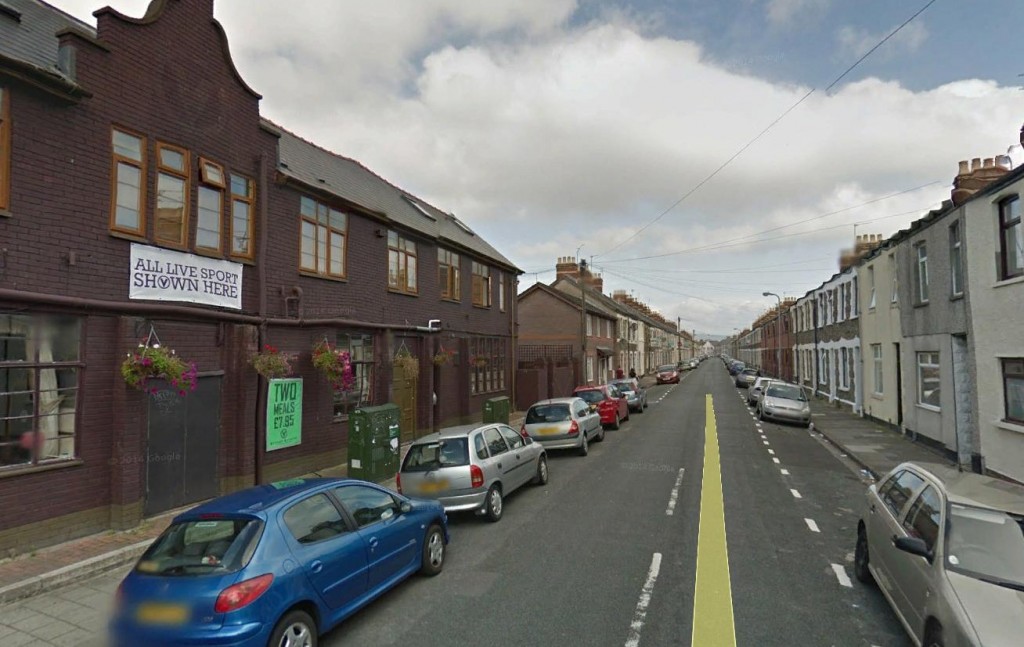I heard some good music (Ivo Evans Band; The Enormous Sizes) at a pub called The End, in a not-very-prosperous part of Cardiff not far from the University. I felt more comfortable there than at the Pen & Wig, the reputed hangout of Science Fiction fans in the city. I popped into that one, briefly, but it looked a bit expensive for me, and no one I saw gave off the tell-tale signs of SF fandom. I felt more comfortable at The End, where I could afford a couple of pints, and I seemed to fit in with the clientele.
Most homes in the U.K. seem to be too cramped to do much socializing in, so the pubs provide a sort of communal living room, where almost all social life is conducted. Unlike the noisy and uncomfortable bars in Toronto, they provide physical comfort, much like any domestic living room. They are not mere boozing joints, or high pressure hunting grounds for sexual partners, as they seem to be back home.
Nevertheless, by sucking up a lot of cash, they contribute to one of the fundamental problems that faces the human race: the tendency of every society to bleed away any kind of surplus that might be accumulated by the average person, so that fundamental improvements in lifestyle and security are difficult to achieve. No matter how many skyscrapers rise on the horizon, the average person makes little economic headway. Higher salaries are invariably accompanied by higher accommodation costs, and the only real improvement seems to be in the availability of some consumer goods, or more choices in entertainment.
Compared to me, the Bollas (my hosts in Cardiff) have huge amounts of money passing through their hands, but the small council house they live in provides no better housing than my apartment in Toronto. The council rates they pay for this very modest row-house swallow most of their income.
More than a century ago, in North America, the invention of balloon-frame construction cut the cost of housing in half. Plenty of open land, and the legal framework of homesteading meant that huge amounts of public and private infrastructure could be built, and at the same time, personal effort could be transformed into savings, or personal investment capital. This triggered the most phenomenal improvement in living standards in human history. For several generations, the gap between the lifestyle of Canadians, Americans, Australians and New Zealanders one the once hand, and the rest of the world was obvious and dramatic. The image of these places as golden lands of opportunity for the common man and woman was fueled by this beneficial ratio, as well as by substantial gains in political democracy, and the reduction of class barriers. Even the Great Depression made only a temporary dent in this general trend of improvement. After World War II, the gap was huge.
A friend of mine described the situation of his parents, who were retirees in a small Canadian town. His father, with minimal education, had worked at a simple factory job, the sort of work where you are responsible for monitoring some gauges and doing some routine procedures. With this modest effort, he was able to build a very nice house (for which, on retirement, he was paying off a mortgage of a few dollars a month), send his son to university, and provide for a comfortable life in retirement. He had great trouble understanding why his son, better educated, and working as a professional engineer, had trouble making ends meet. This profound contrast became normal after the 1980, when the progressive leap forward of North American life began to run out of steam. Canada and the United States now operate more or less like the rest of the world, with the average person drained of whatever income they earn at the rate it is made, mostly to provide roofs over heads. Consumer credit provides most of the “extras”, depending on anticipated improvements that may not come. The statistics tell a sad story: the average Canadian or American works longer hours now than a generation ago, and rather than accumulating savings, accumulates debts. This was the essence of the “Reagan Revolution,” which was, like most “revolutions” basically an empowering of the rich by dis-empowering everyone else.
Where has the money gone? In the United States, it has been squandered on a vast military establishment, which throws it away in immensely destructive and purposeless imperialist wars, and on the building up of an Old-European-style aristocracy. This is a process that began in earnest with the Vietnam War, and the growth of the profoundly un-American cult of the Presidency.
America’s level of personal and public debt is now so high that it is difficult to imagine any degree of economic dynamism that could ever pay it off. America is essentially bankrupt, living for the moment on credit that will, sooner or later, be cut off. Yet, at the same time, there is a growing layer of permanently privileged wealth that lives in unbelievable luxury, with little productivity to justify it. In short, America has become Victorian England, and it won’t be long before Americans are cringing before their “betters”, doffing their caps, and murmuring “begin’ your pardon, Squire” to an assortment of aristocratic jackasses. This, no doubt, will be dressed up in the language of the “market economy” to which it is a fundamental contradiction and violation.

0 Comments.